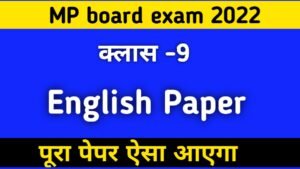MP board 9th English Question Paper 2022:- नमस्कार प्यारे छात्रों स्वागत है आपका exam Deep वेबसाइट पर, आज की पोस्ट क्लास 9th के छात्रों के लिए बहुत important होने वाली है क्योंकि यह पोस्ट क्लास 9th अंग्रेजी वार्षिक पेपर के संबंध में कि जो एमपी बोर्ड के क्लास 9th के छात्रों का सोमवार 21 मार्च 2022 को अंग्रेजी विषय का पेपर होने वाला है तो इसको लेकर क्लास नाइंथ के विद्यार्थी गूगल पर भी नाइंथ अंग्रेजी वार्षिक पेपर के संबंध में या पेपर पेटर्न को लेकर भी सर्च कर रहे हैं तो छात्रों अगर आप भी नाइंथ अंग्रेजी वार्षिक पेपर देने वाले हैं तो आप बिल्कुल सही जगह पर आए हैं क्योंकि इस पोस्ट में हम आपको बताने वाले हैं आप का अंग्रेजी का पेपर कैसा आने वाला है या अंग्रेजी पेपर का पूरा पैटर्न –

और जो छात्र क्लास 9 अंग्रेजी क्वेश्चन बैंक पीडीएफ डाउनलोड करना चाहते हैं उनके लिए भी हम अंग्रेजी full Solution क्वेश्चन बैंक PDF लेकर आए हैं मात्र एक क्लिक के अंदर आप PDF डाउनलोड कर पाओगे और उसके अंदर सभी questions के आंसर आपको मिल जाएंगे जिससे आप अपने अंग्रेजी पेपर में और भी अच्छे नंबर लेकर आ सकते हैं।
9th English Question Paper 2022 MP board- कक्षा 9वी अंग्रेजी वार्षिक पेपर 2022
CLASS – 9th
SUBJECT – ENGLISH
Time: 3 hours Maximum Marks- 80
Instructions- 1. All questions are compulsory
Section – A:
(Reading Comprehension)
Q.1. Read the following passage and answer the questions on the basis of compreheWnsion of the passage.
Lalita sowed some tomato seeds in her garden. The seeds grew into little plants after a few days. She removed every weed. She never allowed any insect near her pet plants. When the days were hot, she watered the plants. She put compost under the plants. The flowers grew and became big. The tiny green tomatoes began to show. Lalita and her sister watered the plants daily. A very large beautiful tomato grew in the plant. Her father said, “It is the finest tomato I have ever seen”. The sisters were very happy.
Questions :―
(i) What did Lalita sow in her garden?
a) Plants b) seeds c) trees. d) grass
(ii) What did she not allow?
a) birds near plants. b) insects near plants
c) flies near plants. d) pets near plants
(iii) What did she put under the plants?
a) Water b) Compost. c) Weeds d) Flowers
(iv) Which of the following is similar in meaning to ‘tiny’?
a) large. b) big c) small d) giant
(v) Why were the sisters happy?
a) because flowers grew in their garden
b) because a tomato grew in their garden
c) because plants grew in their garden
d) because their father was happy
Q.2. Read the following passage and answer the questions on the basis of compreheWnsion of the passage.
We are living in the Age of Science. Everyday new inventions are being made for the good of humanity. The scientific inventions began after the Industrial Revolution of 1789. Within these 200 years, science has made a wonderful progress. The aeroplane is one of the most important inventions of science during the Modern Age. It is the fastest means of transport known so far. An aeroplane resembles a flying bird in shape. Inside there are seats for the passengers and a cabin for the pilot. This cabin is called a cockpit. It has an engine that is worked by petrol. It is all made up of metal and can fly at a very high speed. Before taking off it runs on the runway for some distance to gather speed. Then it suddenly hops up the earth and takes off.
Questions :―
(i) The scientific invention began after the Industrial Revolution of ___.
a) 1889. b) 1879. c) 1789. d) 1779
(ii) The cabin for the pilot is called a ___.
a) cube. b) cockpit c) cubicle. d) chamber
(III) An aeroplane has an engine that is worked by___.
a) petrol b) steam. c) diesel d) gas
(iv) Which of the following is the fastest means of transport?
(a) motor vehicle (b) ship (c) train (d) aeroplane
(v) We are living in the ___.
a) Age of Industrialisation. b) Modern
c) Age of Inventions d) Age of Science
SECTION- B
(WRITING)
Q.3 Read the following passage and make notes on it and also give a suitable title to it.
Biogas is a mixture of methane, carbon dioxide, hydrogen and hydrogen sulphide, the major constituent being methane. Biogas is produced by anaerobic degradation of animal wastes (sometimes plant wastes) in the presence of water. Anaerobic degradation means break–down of organic matter by bacteria in the absence of oxygen. Biogas is a non-polluting, clean and low-cost fuel which is very useful for rural areas where a lot of animal waste and agricultural waste are available. India has the largest cattle population in the world (240 million) and has tremendous potential for biogas production. From cattle dung alone, we can produce biogas of a magnitude of 22,500 mm3 annually. Air-tight digestion/degradation of animal waste is safe as it eliminates health hazards which normally occur in case of direct use of dung due to direct exposure to faecal pathogens and parasites .
Q.4. You are Amit Gupta studying in Govt. HSS Rewa. Write an application to your principal to issue Transfer Certificate as your father has been transferred to Shivpuri.
or
Yor are Rahul, residing at 432/4, behind Govt. Hospital, Bhind. Write a letter to your friend inviting him to attend your sister’s marriage ceremony.
Q.5. Write an essay on any one of the following topics in 150 words.
a) An Indian Festival
b) Wonders of Science
c) Importance of Trees
d) My Hobby
Q.6. On the basis of the picture given below, write a short paragraph about the importance of trees.
Section-C
(Grammar)
Q-7 Fill in the blanks choosing the correct alternative given in the brackets (any five)
(i) He is ______ engineer. (a/an/the)
(ii) The bank —– some interest for your money. (give/gives)
(iii) Sharad——–watching TV when the power went off. (was/were)
(iv) How —— water is left in the bottle? (much/many)
(v) We need —–money (some/any)
(vi) _____ I take your pen? (may/can)
(vii) Health is ____ than wealth. (good/better/best)
Q.8 Do as directed (any five)
(i). Rohan speaks English. (Change the sentence into negative)
(ii) He is very tired. He cannot work anymore. (Combine using ‘so—that’)
(iii) your pen? / Can / give me / you (Rearrange the jumbled words into a meaningful sentence)
(iv) He is too weak to lift this box. (Rewrite the sentence using ‘so…. that’)
(v) He eats bananas. (Change into passive voice)
(vi) He is rich. He is not happy. (Combine the sentences using ‘yet’)
(vii) Unless you work hard, you can’t pass. (Use “if” in place of “unless”)
Section-D
(Literature)
Q.9. Answer the following questions.(any six)
(i). Where did Tommy find the book?
(a) in the library. (b) in Margie’s house
(c) in his house (d) in his friend’s house
(ii) What does Yellow woods mean?
(a) falling leaves. (b) forest with yellow leaves
(c) wood yellow in colour. (d) none
(iii). Where did Bismillah play the Shehnai on 15th August 1947?
(a) Ganga Ghat. (b) Banaras
(c) Red Fort. (d) Montreal
(iv) What did the grandmother give to Kezia when she was sobbing?
(a) a clean hanky (b) a chocolate
(c) an ice-cream. (d) a toy
(v) Who is the author of the lesson “My Childhood”?
(a) A. P. J. Abdul Kalam. (b) Katherine Mansfield
(c) Isaac Asimav (d) Deborah Cowley
(vi) What causes war?
(a) hatred. (b) love. (c) religion. (d) countries
(vii) What helps the tree to grow?
(a) earth. (b) air. (c) gardener. (d) none
Q.10 (A) Read the following extract and answer the questions given below-
Evelyn Glennie’s loss of hearing had been gradual. Her mother remembers noticing something was wrong when the eight-year-old Evelyn was waiting to play the piano. ‘They called her name and she didn’t move. I suddenly realised she hadn’t heard,’ says Isabel Glennie. For quite a while Evelyn managed to conceal her growing deafness from friends
and teachers. But by the time she was eleven her marks had deteriorated and her headmistress urged her parents to take her to a specialist.
Questions :–
i). Evelyn’s loss of hearing take place—
a) at birth b) eight years old c) eleven years old
ii) Evelyn managed to hide her deafness from-
a) her mother. b) her friends c) her specialist
iii) Who urged her parents to take her to a specialist?
a) friends b) teachers. c) headmistress
(B) Read the following extract and answer the questions given below-
Two roads diverged in a yellow wood.
And sorry I could not travel both
And be one traveller, long I stood
And locked down once as far as I could
To where it bent in the undergrowth
i) What does ‘yellow wood’ mean?
(a) spring. (b) autumn (c) winter
ii)Why was the traveller feeling sorry?
a) because he could not travel
b) because he could not travel both the roads
c) because he could travel
iii) From which poem the above lines have been taken?
(a)Wind. (b)The Road Not Taken. (c) Rain on the Roof
Q.11 Answer the following questions in 30 words (any six)
- What kind of teachers did Margie and Tommy have?
- What did Margie write in her diary?
- When was Evelyn’s deafness first noticed? When was it confirmed?
- When did she leave home for Delhi, and why?
- Why was Kezia afraid of her father?
- Name the two temples the author visited in Kathmandu?
- Why did Einstein write a letter to Franklin Roosevelt?
- How is a Shehnai different from a Pungi ?
Q.12 Answer the following question in 30 words (any two)
- Which of the two roads did the poet choose and why?
- How does the poet suggest that all people on earth are the same?
- What does the poet mean by ‘spirit’ and in what state was it?
Q.13. Answer the following question in 30 words (any two)
- What are the things the child sees on his way to the fair?
- Who is the real culprit according to the king?
- Who was Behrman?
Q.14 Answer the following questions in about 70 words- (any two)
- How does Tommy describe the old kind of school?
- Why did Bismillah Khan refuse to start a shehnai school in the U.S.A.?
- What incidents during the Everest expedition show Santosh’s concern for her teammates?
Q.15. Why does the poet call harvests ‘peaceful’ and war as ‘winter’?
or
Where did the two roads diverge? What was the difficulty?
Q.16. What do you think happens in the end of the story ‘The Lost Child’? Does the child find his parents?
or
What is Behrman’s masterpiece? What makes Sue say so?
Note:- सैंपल पेपर के माध्यम से जापानी गार्डन क्लास नाइंथ इंग्लिश क्वेश्चन पेपर को समझ सकते हैं कुछ इस प्रकार से उसका पेपर का पैटर्न रहेगा।

